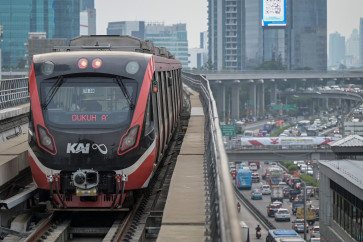Global minimum tax: Indonesia must safeguard its tax rights
Indonesia needs to accelerate legislation so it can take full advantage of the GLoBe tax regime and its QDMTT tax facility, which will protect is right to tax multinationals.
Change text size
Gift Premium Articles
to Anyone


The race to the bottom in global tax, with worldwide tax rates dwindling to attract investment, has been widely debunked as harmful. In this race, multinational enterprises (MNEs) could "shop around" to minimize their tax burden at the expense of a country’s citizens, who should have received the benefits of taxes.
According to the Tax Foundation (2021), the worldwide rate of corporate income tax (CIT) averaged 40.11 percent in 1980 and had declined to 23.54 percent in 2021. Moreover, worldwide CIT avoidance stands at US$100-240 billion every year (Organisation for Economic Co-operation and Development/OECD, 2021).
To combat unhealthy competition, the OECD and the Group of 20 have agreed on the Global Anti-Base Erosion Rules (GloBE), intended to ensure that MNEs pay an agreed minimum tax.
The GloBE is one of the key planks of a larger project called the Two Pillar Solution spearheaded by the OECD to address the tax challenges in a globalized economy. The GloBE will enforce a global minimum effective tax rate (ETR) of 15 percent on profits of more than 750 million euros ($803.54) of annual revenue that MNEs earn.
The ETR reflects the actual proportion of tax levied on a company's profits. Thus, although a country’s CIT rate may be well above 15 percent, a company’s ETR may be below 15 percent due to tax incentives or computational differences.
Under the GloBE, the parent entity of an MNE is able to pay a “top-up” tax on itas subsidiary with an ETR below 15 percent. Any jurisdiction can still set whatever CIT rate it wants, but if an MNE pays lower rates in a particular country, the country where its parent entity is headquartered will impose the top-up tax, eliminating profit shifting as an incentive.
For example, say that X Company’s parent entity is located in the United Kingdom. X Company has a subsidiary in the Cayman Islands, a tax haven country with a 0 percent tax rate. X Company also has a subsidiary in Indonesia, where it uses tax incentives to result in an ETR of 10 percent. Under the GloBE regime, the UK can impose a top-up tax of 15 percent (15-0 percent) on its subsidiary in the Cayman Islands and of 5 percent (15-10 percent) on its Indonesian subsidiary.
The GloBE represents a revolutionary agreement on an international tax regime because countries have never agreed on tax rates before. However, many have criticized its design because the GloBE gives more advantages to high-income countries, where most MNEs are headquartered.
The rationale behind this design is that countries should tax the incomes of large MNEs if other countries do not exercise their right to tax that income. In the above example, Indonesia and the Cayman Islands are not fully exercising their ing right.
Indonesia has far fewer parent entities of MNEs than subsidiaries or affiliate branches. Thus, there is a possibility that Indonesia and other emerging economies, or low-income countries, will only gain little added revenue.
However, Indonesia may safeguard its tax rights by applying a Qualified Domestic Minimum Top-Up Tax (QDMTT), which will allow it to increase the ETR of domestic entities to 15 percent. Thus, other countries will be unable to incur a GloBE top-up tax on the relevant income. In other words, any country that enacts a QDMTT policy will have priority tax rights over the countries where a parent company is headquartered.
The idea to favor lower middle income countries in allocating tax rights by giving priority to domestic minimum tax over the global minimum tax has been called an afterthought or surprising development (Lanthier, 2022), as it has not been explicitly addressed in the GloBE blueprint published in 2020 and simply appears in the model rules published in December 2021.
Although discussions over the QDMTT have appeared recently, many jurisdictions are seriously considering adopting it. For instance, the UK and Switzerland have explored the idea of adopting a QDMTT in public consultations and expect to gain extra revenue from such a tax. The European Union is also allowing its member states to apply a domestic top-up tax, stating that it might be necessary to preserve sovereignty.
If most countries adopt a QDMTT, the global minimum tax will become a secondary policy. Thus, the QDMTT will put a floor on tax competition and achieve the main objective of the GloBE regime.
Over 130 countries, including Indonesia, have agreed to the GloBE global tax deal. To implement, countries that sign the deal must pass relevant laws. In Indonesia, the Tax Harmonization Law has paved the way to implement the GloBE regime.
The policy option that remains free for us to decide is whether to adopt the QDMTT, which should have an obvious answer. If adopting the QDMTT will prohibit other countries from exercising their tax rights on incomes earned in our country, why wouldn’t we do so?
The QDMTT should also be implemented through a domestic regulation, and does not require a global convention. It is worth noting, however, that the domestic law must be consistent with the GloBE.
It might take some time to fully absorb the OECD’s 70-page GloBE model and the 228-page commentary. The challenge now is to formulate the domestic regulations for implement the GloBE and QDMTT in a limited time. The GloBE deal is to become effective in 2023.
The government must also communicate intensively with relevant stakeholders because the GloBE and QDMTT will add complexities to the tax system. Lastly, as the holder of the G20 presidency, Indonesia must also take the lead in ensuring that developing countries will receive technical assistance from more advanced countries to develop their regulations, as well as to enhance the capacities of tax officials in administering the global tax.
***
The writer is a researcher at the Center for Indonesia Taxation Analysis (CITA). These views are personal.









